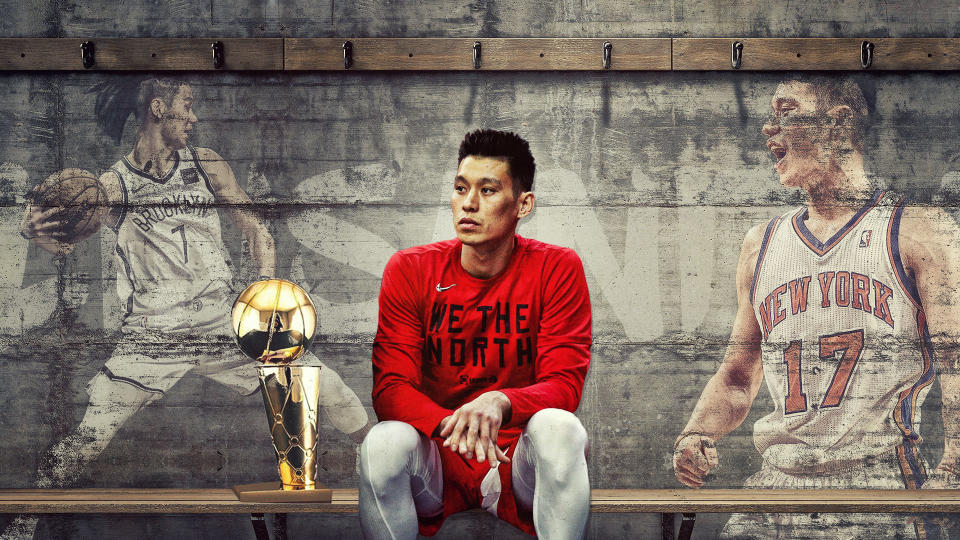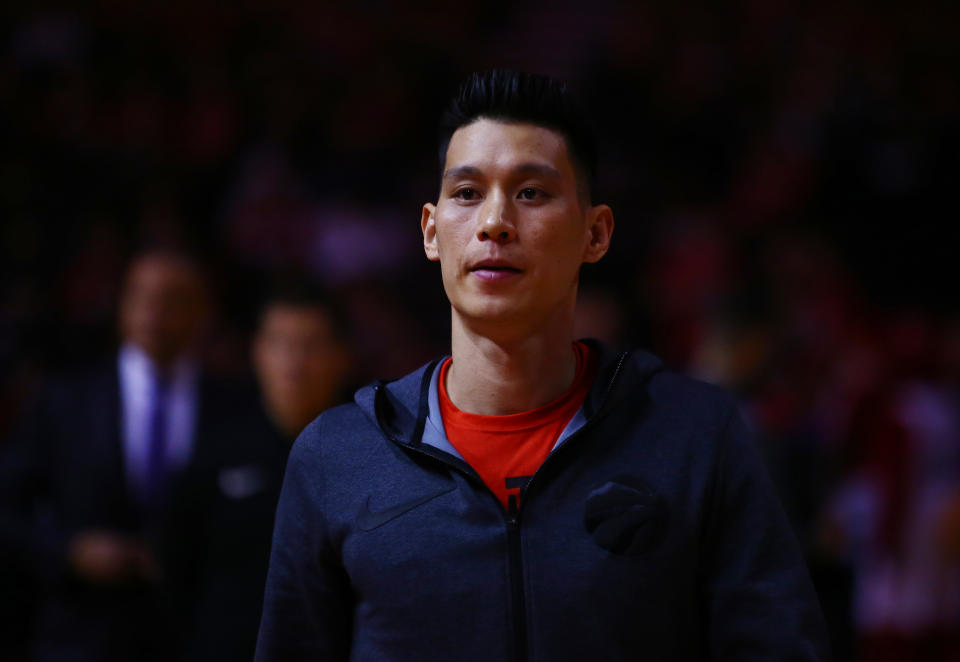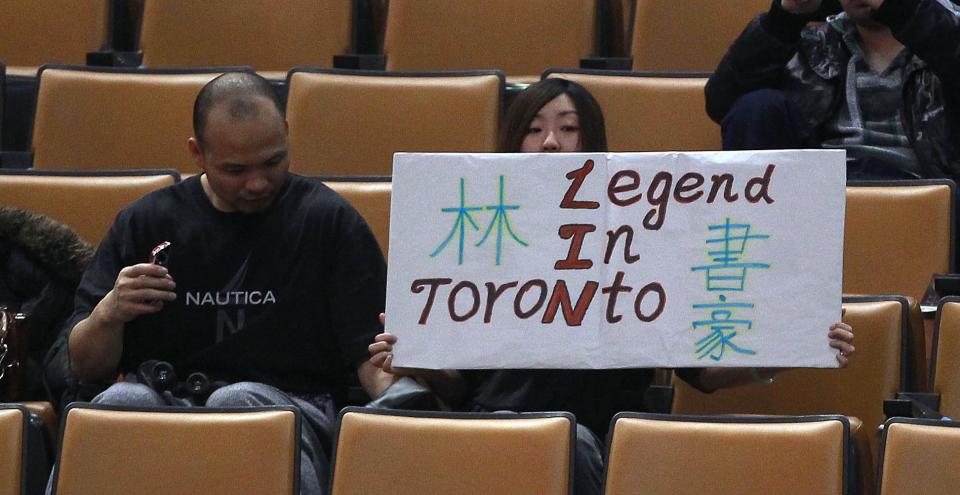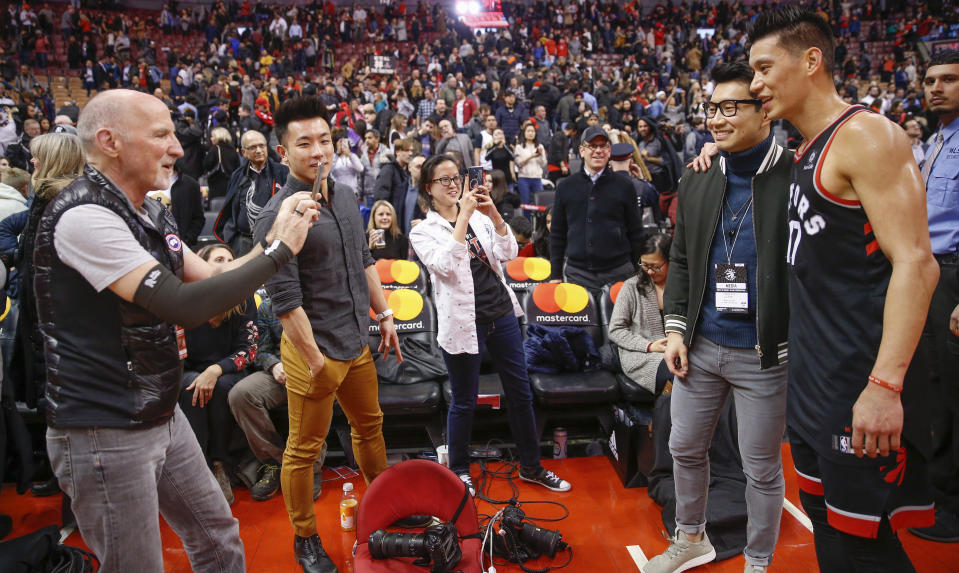The end of Jeremy Lin: An ode to the great Asian-American sporting icon

The rules are simple: You get five seconds to make a basket. If you make it, the defender is out; if you miss, you’re out.
Throughout the Toronto Raptors’ quest to their first NBA championship, I regularly arrived roughly three hours early. Given the choice between hanging out within the downtown Orlando radius of the Hamptons Inn or taking in the calm before the storm in the empty gym filled with just third stringers and assistant coaches, the choice was obvious. Let me see what Jeremy Lin was up to.
And there he was, the great Asian-American sporting icon of our generation, draped in drab warm-up gear as if he were a ball boy. Lin was in a group with three G-Leaguers in Malcolm Miller, Eric Moreland and Jordan Loyd. None of them expected to play, so they maintained fitness through endless rounds of one-on-one. It became so repetitive that Loyd and Moreland would often pound each other over foul calls like annoyed brothers in the backseat of a long road trip.
Having played more NBA games than the other three combined, Lin should have shined. What I saw instead made me profoundly sad. Lin would probe, pivot and power his way to the basket but he couldn’t consistently shake his man and get his shot. He lacked the craft to finish over the 6-foot-10 Moreland, Miller matched him for quickness, and he didn’t have the handle to elude Loyd. Eventually, Lin just started firing jumpers without even attempting to make a move, and even those shots failed to land with any level of regularity.
When the featured rotation players started to trickle in, the third stringers stopped sparring and headed for the locker room. As the media filed in — “planting their sticks” as they call it in the industry — at least a quarter of the eyeballs stayed glued to Lin as he exited the floor. Those stares belonged members of the Chinese media stationed half a world away for rare flashes of a fading star.
If my Mandarin was above a level of playing mahjong with my grandma (I really should have stuck it out in Chinese school) then I would have asked them the question that was ringing through my mind: Is this the end of Jeremy Lin?

I remember the exact moment it was reported that Lin was negotiating a buyout with the Atlanta Hawks with the intention of joining my hometown Raptors. I was at the airport, about to board a flight from Toronto to Bogota and truth be told, I was more excited about that latest tweet from Adrian Wojnarowski.
As a fan, I was ecstatic. The Raptors had just traded Delon Wright in a deal for Marc Gasol, and virile underdog Fred VanVleet was very much playing like a 5-foot-11 basketball player with a back problem. Lin wasn’t just a nice addition after coming off a strong showing with the Hawks, but at the time, he was also a necessary one. Lin didn’t have to be just a fill-in, he could have been an upgrade. I realize that this sounds ridiculous in hindsight given how poorly Lin fit into the Raptors’ schemes, but circumstances were different in February.
As an Asian-American, this mattered to me for obvious reasons, although many have since scoffed at this as if it’s trivial. To those who express that cynicism, I propose a quick thought exercise: Name seven Asian celebrities in 15 seconds without saying Jeremy Lin. I’ll bet that most of them won’t even get past five. Bruce Lee, Jackie Chan, Yao Ming, Sandra Oh, maaaybe Jet Li, and that’s about it. That’s the significance of Lin, and in my case, it was two worlds colliding as he was going to play for my team. It would be like if Bill Murray was a reliever for the Cubs, or if Spike Lee coached the Knicks. It’s a big deal.
I wasn’t delusional — I didn’t think that Lin would make or break the championship run, but I was bursting with excitement. Seeing an Asian player on the Raptors was always a pipe dream and never once did I actually think it would come to fruition. I spent the entire five-hour flight to Colombia picturing what would come next, and writing down my thoughts.
Mostly, I felt conflicted.

It was the same conflict I felt when Lin hit the dagger at the Air Canada Centre during the height of Linsanity.
The score was 87-all. Iman Shumpert had just bricked a jumper but Tyson Chandler secured the rebound. The Knicks had the ball with a dead shot clock and Lin looks back to the bench at Mike D’Antoni, who elects not to call timeout. Instead, he tells everybody — including an established All-Star in Amar’e Stoudemire — to clear out for this nobody that was in the D-League two weeks prior. Lin waves off the screen, kills the clock, crosses over from left to right, and swishes the three.
Mike Breen croons over the MSG broadcast: “The crowd on its feet here at the Air Canada Centre … Lin puts it up … BANG! JEREMY LIN FROM DOWNTOWN! AND THE KNICKS TAKE THE LEAD!”
I felt torn, just as the arena was that night. The ACC exploded with excitement and imploded with disappointment all at once, and to this day I have never heard anything else like it. Half the arena — and keep in mind there are at least a quarter-million Chinese people in every pocket of the Greater Toronto Area — were overjoyed, while the other half were Raptors fans who paid a premium to attend the game with their partners only to be heartbroken on Valentine’s Day.
I felt both emotions. I couldn’t decide if I was being too Asian for feeling overcome with pride, or if I wasn’t being Asian enough because I couldn’t put aside my Raptors fandom to soak in the moment. I recreated the Asian version of the Alonzo Mourning meme and went back to studying organic chemistry.
(By the way, the Raptors led for most of that game against the Knicks, but gave it up at the end with a closing lineup of a defensive turnstile in Jose Calderon, a washed Leandro Barbosa, an on the cusp of being amnestied Linas Kleiza, the foul-prone Amir Johnson, and a yet-to-blossom DeMar DeRozan. Oh, how far they’ve come.)

Seeing Lin close up during his season with the Raptors, I came to understand that conflict — what’s the appropriate amount of Asian? — was central to the entire Jeremy Lin experience, so much so that his whole career was consumed by it. And it was for that reason I was so strongly drawn to him.
“I used to run from it, because that’s all anybody ever wanted to ask about. Oh, he’s Asian, he’s Asian, he’s Asian,” Lin said. “I was like, talk about my basketball. But now, people are seeing I can play and I belong in the NBA, and I’ve really embraced just being able to represent Asians and to do that in the right way hopefully and do my best.”
It needs to be said that Lin never asked for the spotlight. He just wanted to beat the odds and become a basketball player instead of whatever mundane job he would have worked with an undergrad in economics. For this unrecruited, undrafted, and unknown senior from Harvard to grind his way up from the D-League and eventually break out on the biggest stage in basketball, that was supposed to be the accomplishment. The fact that he also happened to be Asian-American was besides the fact, except it never was.
The story with Jeremy was always about race and identity. There just aren’t many examples of Asian-Americans thriving in the four major North American sports, and so that was always a point of fascination. Asians showed up in droves because who else did we have? We were invisible, and out of nowhere, one of us was suddenly out there hitting game-winners and dumping 38 points on Kobe Bryant. Even non-Asians couldn’t see beyond his identity, to the point where a run-of-the-mill ESPN article on Lin’s turnover woes was crassly captioned “chink in the armor” for no reason other than that his skin was yellow.
Jeremy might not admit it publicly, but he wasn’t welcomed. Bryant said before facing the Knicks that he didn’t even know of Lin. There was the not-so-subtle displeasure from Carmelo Anthony that the Knicks found another star to challenge his own. And when Lin faced the Miami Heat, Dwyane Wade and LeBron James took a particular delight in tormenting him. It wasn’t that he was hated, but there was a perception that Lin got more than he deserved because he was Asian, and it didn’t sit right that he was seemingly jumping the queue.
Jeremy was careful not to feed into it. At times it felt like he was the only one who saw himself as a basketball player, while the world saw him as an anomaly. I’m not sure how he ever made his peace with it. He didn’t want to lean into his identity, but there was no getting around the fact that he was different. He even made an entire video about cultural differences, without directly saying why he was so different.
My hope is Jeremy knows that in being different, he became so familiar.
There’s an emerging and overdue conversation of where Asians belong in the Western world, and this personal essay isn’t the place for it. But on a much smaller scale, the same confusion and dysphoria on Lin’s part is felt by Asian-Americans all over. I feel it constantly.
What are we supposed to do, who are we supposed to be, where are we allowed to exist, and how Asian is too Asian when Asian is always othered? In order to really navigate these uncharted waters to reach some semblance of clarity, we as a people need compasses like Lin so we can learn from their lived experiences.
See it from his perspective: Jeremy walked into work every day as the outsider. It’s not even about stereotypes and assumptions so much as he was always made to feel foreign despite being born and raised in California. Jeremy is as normal as they come — he likes basketball, gaming, and making YouTube videos — but he was never seen as such. He shouldn’t be as noteworthy as he is, except there are few other examples of him in the public sphere, and so he is anointed.
And so for that, I was thrilled to see Jeremy lift the trophy. No, he didn’t contribute in points, rebounds, or assists, but titles are about more than crowning the best. The championship is the ultimate validation of a player’s career, and Lin’s unique journey is worthy of celebration. Representation is a heavy burden, and Jeremy had no say in carrying that weight. He’s a pioneer and a groundbreaker — winning a ring is the least of what he deserves.
Jeremy Lin is not messsing around. pic.twitter.com/UpE1pFteAu
— Angry Asian Man (@angryasianman) May 31, 2019
The last time I saw Jeremy was at the championship parade.
He was on the last bus — the one from which Marc Gasol nearly capsized — and he mostly chilled with future Marvel action hero and current Kim’s Convenience heartthrob Simu Liu. Lin and I happened to rock the same outfit — the special edition purple Chinese New Year throwback Tracy McGrady jersey — and he picked out my giant head from the crowd, and signed my kit. It’s my favourite piece of championship gear, right along with a handful of red confetti from when the Raptors swept the Bucks.
It was after that final Bucks game that I found Jeremy loitering in the tunnel waiting for Simu. Although I had not spoken to him previously, nor was it great journalism etiquette, I felt compelled to approach. I told him that I was really happy that he was going to the Finals, and that he really deserved to be on that stage. He didn’t take it in at the time, and even with the ring in hand, Jeremy still said he didn’t deserve it. That broke my heart a little.
My heart broke fully when people ridiculed Jeremy for crying over the abrupt end of his NBA career. There was this sense that he wasn’t worthy of empathy because he had already gotten more than he deserved. It’s the same undertone that has scored his entire career, that it was pity and novelty which kept him employed, merit aside. If that held any weight, Jeremy wouldn’t be the only Asian-American in the game.
Jeremy Lin has made more than $65M in his career and has a degree from one of the most prestigious universities in the world.
Let me get your “rock bottom” my man.
pic.twitter.com/JlLyFQff6i— Colin Dunlap (@colin_dunlap) July 28, 2019
I saw a disheartened man who had the book closed on him. I saw someone who was robbed of his prime due to injuries, battled back from a ruptured patella tendon, and who could have stuck it out another year had he remained in Atlanta and put up inflated numbers, as opposed to riding the bench for a contender. Athletes die twice — finally, at the end of it all but first, when their careers end — and there’s no easy way to cope. Being open and transparent about that pain makes Jeremy strong, not weak, and as always, I felt proud that he was one of us.
We have arrived at the end of Jeremy Lin. His storybook career has settled inevitably in China, as he has agreed to sign in Beijing. For most NBA players it’s shameful to cross the Pacific and if Jeremy had his pick, he would stay here. But my hope is that Jeremy can at least find some rest. Finally, in a league of his own, Lin will be just a basketball player, and that’s all he ever wanted.
More Raptors coverage from Yahoo Sports

 Yahoo Sports
Yahoo Sports 

